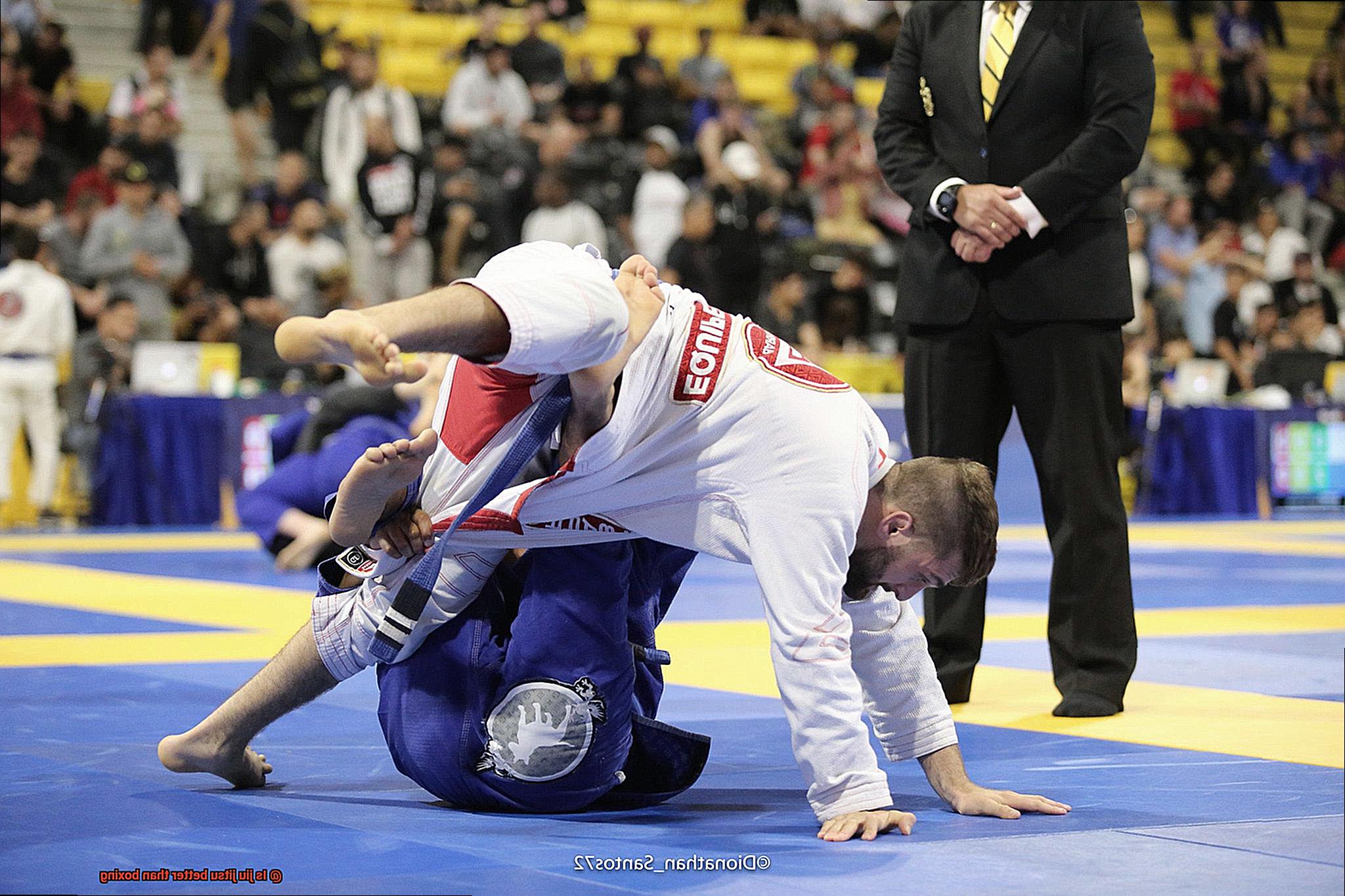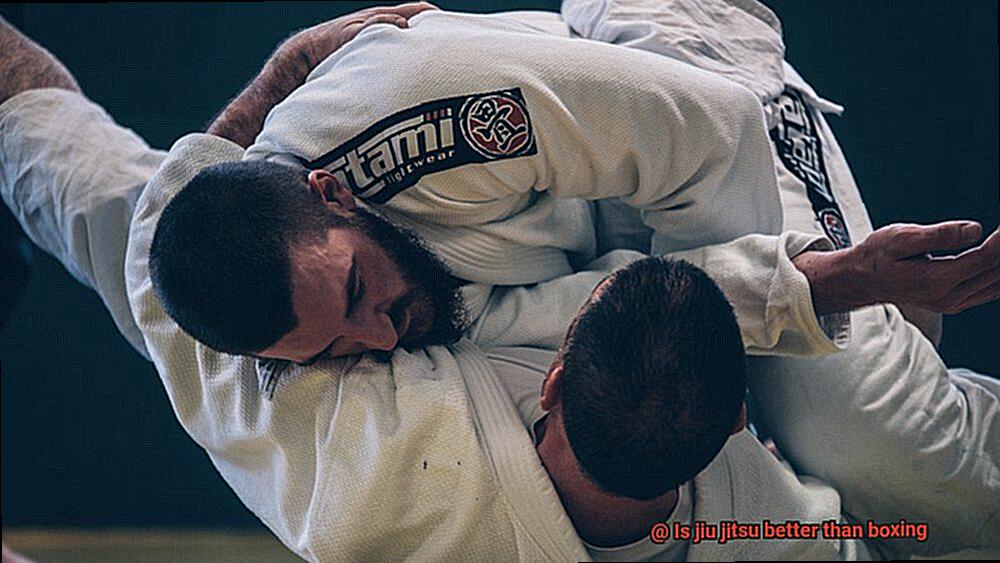Imagine finding yourself in a precarious situation where you need to defend yourself or someone you care about from an attacker. Would you rely on your boxing skills and throw powerful punches, or would you use jiu-jitsu’s grappling techniques and submission holds to subdue your opponent? It’s an age-old debate that has been going on for years, but the answer isn’t as simple as one might think. The truth is that both jiu-jitsu and boxing have their own unique advantages and disadvantages, and the choice ultimately depends on personal preference, skill level, and the circumstances.
Boxing is renowned for its ability to deliver devastating blows with superior hand-eye coordination, while also providing high-intensity workouts that improve cardiovascular health. In contrast, jiu-jitsu focuses more on grappling techniques such as joint locks and submissions that target vulnerable areas to control your opponent. While it may seem like boxing has the upper hand in a street fight scenario, there are many instances where jiu-jitsu has saved the day. UFC fighters like Royce Gracie and Demian Maia have proven time and again how effective jiu-jitsu can be in real-life fights.
In this blog post, we’ll delve deeper into the pros and cons of both martial arts and explore which one is better suited for self-defense. We’ll examine the physical demands, mental focus required, as well as practical applications of both boxing and jiu-jitsu. By the end of this post, you’ll have a better understanding of each martial art’s strengths and weaknesses, making it easier for you to decide whether jiu-jitsu is indeed better than boxing when it comes to self-defense.
What is Jiu Jitsu?
Jiu Jitsu is not just any martial art – it’s a grappling-based fighting style that has been refined over centuries in Japan. With its focus on technique and leverage, it involves using joint locks, chokeholds, and leverage to control and submit opponents. If you’re looking for a practical way to defend yourself or improve your physical fitness level, jiu jitsu may be the perfect answer for you.
One of the key principles of Jiu Jitsu is that it allows smaller, weaker individuals to defend themselves against larger, stronger opponents. Through the use of technique and leverage, jiu jitsu practitioners can control and submit their opponents without relying on brute strength. It’s like using a lever to move a heavy object – it requires less effort and yields greater results. By mastering these techniques, you’ll be able to defend yourself effectively regardless of your size or strength.
But that’s not all – jiu jitsu has numerous health benefits too. Regular practice can improve cardiovascular endurance, increase flexibility, and enhance coordination. It provides an excellent workout that can help improve your overall physical fitness level.
Jiu jitsu also emphasizes ground fighting techniques, which is crucial in real-life situations where fights often end up on the ground. By learning how to control and submit an opponent on the ground, you’ll be better equipped to defend yourself in a variety of situations.
So why choose jiu jitsu over other martial arts like boxing or kickboxing? While these arts are great for striking techniques and improving hand-eye coordination, jiu jitsu offers a more well-rounded approach to self-defense. It teaches students how to defend against various attacks, including chokes, holds, and joint locks. Plus, its emphasis on technique and leverage means that even smaller individuals can effectively defend themselves against larger opponents.

Advantages of Jiu Jitsu
Look no further than Jiu Jitsu. This grappling martial art originated in Japan and has gained immense popularity worldwide. Here are the top three advantages of Jiu Jitsu over boxing.
Firstly, Jiu Jitsu provides a comprehensive full-body workout. Unlike boxing, which focuses mainly on upper body strength and cardio, Jiu Jitsu engages your entire body. From grappling to ground fighting and submissions, this martial art requires both upper and lower body strength, flexibility, and endurance. With regular practice, not only will you improve your physical fitness but also develop a greater sense of body awareness and control.
Secondly, Jiu Jitsu offers a more well-rounded approach to self-defense. While boxing is effective in a street fight scenario, it doesn’t provide the same level of preparation for ground fighting situations. Jiu Jitsu teaches practitioners how to defend themselves in various scenarios, including ground fighting – often neglected in other martial arts. This makes it the ideal choice for those who want to feel confident in their ability to protect themselves in any situation.
Thirdly, Jiu Jitsu emphasizes technique over brute force. While boxing relies on powerful punches and quick footwork, Jiu Jitsu teaches you how to use leverage and technique to gain an advantage over your opponent. This makes it an effective martial art for individuals of any size or strength level. You don’t have to be the biggest or strongest person in the room to succeed – technique matters more.
In addition to these advantages, practicing Jiu Jitsu can also improve mental focus, discipline, and resilience. It requires practitioners to think strategically and make quick decisions under pressure, which can translate into other areas of life as well.
Overall, while boxing has its benefits, Jiu Jitsu offers a more comprehensive approach to martial arts training. With its full-body workouts, self-defense skills, emphasis on technique over brute force, and mental benefits, Jiu Jitsu is an excellent choice for anyone looking to improve their physical and mental well-being.
Disadvantages of Jiu Jitsu
Jiu Jitsu is a thrilling martial art that can help improve one’s physical and mental well-being. However, it is crucial to keep in mind the drawbacks that come with practicing this sport before deciding if it is the right fit for you.
One disadvantage of Jiu Jitsu is the physical toll it takes on the body. The constant grappling and rolling can lead to injuries such as sprains, strains, and even broken bones. It’s important to remember that this is a combat sport and injuries are an unavoidable aspect of it. Nonetheless, proper training and preparation can help reduce the risk of injury.
Another disadvantage of Jiu Jitsu is the steep learning curve compared to other martial arts. The techniques and movements require a lot of practice and patience to master. It may take months or even years before a student can feel confident in their abilities. This can be discouraging for some students who may not have the time or dedication to commit to the practice. However, with persistence and determination, anyone can enhance their Jiu Jitsu skills.
Lastly, Jiu Jitsu competitions can be nerve-wracking and intense. The pressure to perform well can be overwhelming, leading to anxiety and even mental exhaustion. Additionally, finding an opponent of similar skill level can be challenging, making it difficult to compete fairly. However, competitions provide valuable experience and can help students improve their skills.
What is Boxing?
Boxing is an ancient combat sport that has stood the test of time, and for good reason. It’s a thrilling spectacle that sees two individuals wearing gloves and trading punches in a ring, with the goal of outsmarting their opponent and emerging victorious.
Boxing is not just about brute force, but also requires skill, precision, and strategy. Boxers use a range of techniques such as footwork, head movement, and combinations of punches to gain an edge over their opponent. This makes it an incredibly challenging and rewarding sport, both physically and mentally.
Boxing is also known for its numerous physical benefits. It can improve cardiovascular health, increase hand-eye coordination, and strengthen the upper body. But beyond the physical aspects, boxing demands mental toughness and discipline as boxers must remain focused and alert throughout the match.
In addition to being a fantastic form of exercise, boxing has gained popularity as a valuable self-defense skill. It teaches individuals how to defend themselves in close-range combat situations, making it an important tool to have in today’s world.
However, it’s crucial to remember that boxing can be dangerous if not practiced safely and with proper technique. That’s why it’s essential to learn from qualified instructors who emphasize safety and correct technique.
Advantages of Boxing
Boxing is more than just a combat sport; it’s a total body workout that offers a variety of advantages. Whether you’re looking to improve your cardiovascular health, learn self-defense techniques, relieve stress, increase your confidence, or improve your coordination, boxing has something to offer. Here are the top advantages of boxing:
Cardiovascular Health
If you’re looking for an intense cardiovascular workout, boxing is the way to go. The fast-paced movements and constant footwork can get your heart pumping, making it an excellent way to improve your overall fitness level. Plus, it can help you burn calories and shed those extra pounds.
Self-Defense
One of the most significant advantages of boxing is learning self-defense techniques. You will learn how to punch, block, and dodge attacks, which can be useful in real-life situations where you need to defend yourself or others. Knowing these skills can give you the confidence to handle any situation that may arise.
Stress Relief
Boxing provides an outlet for your emotions and helps you release tension. It’s a great way to channel any negative energy into something positive and productive. Plus, the physical activity of boxing releases endorphins that improve your mood and reduce stress.
Increased Confidence: As you learn new skills and improve your physical fitness through boxing, you will likely gain more self-confidence. This newfound confidence can carry over into other areas of your life, such as work or relationships.
Improved Coordination: Boxing requires coordination between your hands, eyes, and body movements. Regular practice can improve your overall coordination and balance, which can also transfer to other activities or sports.
While boxing is an excellent sport with many advantages, it’s crucial to note that it can be a high-impact activity that may lead to injuries if proper safety measures are not taken. Always wear appropriate gear and listen to your body to avoid unnecessary injuries.
In comparison to jiu-jitsu, boxing is a more focused and specialized discipline that emphasizes striking techniques with the hands and feet. Jiu-jitsu, on the other hand, is a grappling martial art that focuses on ground fighting and submission holds. Ultimately, which sport is better depends on personal preferences and goals.
Disadvantages of Boxing
Boxing is a sport that can be both exhilarating and empowering. However, it’s essential to acknowledge its disadvantages as well. As an expert in boxing, I must stress that one of its most alarming drawbacks is the risk of brain damage. Repeated blows to the head can cause long-term harm to the brain, leading to neurological disorders that may affect a boxer’s quality of life. This is especially true for professional boxers who fight frequently.
Furthermore, boxers are at a high risk of sustaining other injuries such as cuts, broken bones, and other severe injuries that may take a long time to heal. These injuries can impact a boxer’s career and overall health. It’s important to note that boxing can be a costly sport, with expenses like training equipment, gym memberships, and personal trainers adding up quickly. These costs can make it inaccessible for some who cannot afford it.
Finally, boxing requires a significant amount of dedication and discipline. Boxers must commit to a rigorous training schedule and follow strict dietary guidelines to stay in fighting shape. This level of commitment can be challenging for people who have other responsibilities such as work or family.
_B0e4H3U0VY” >
Conclusion
When it comes to the debate of jiu-jitsu versus boxing for self-defense, there’s no easy answer. Each martial art has its own pros and cons, so the decision ultimately depends on personal preference, skill level, and circumstances.
Boxing is famous for its ability to deliver powerful punches with excellent hand-eye coordination while providing a high-intensity workout that boosts cardiovascular health. On the other hand, jiu-jitsu emphasizes grappling techniques like joint locks and submissions that target vulnerable areas to control an opponent. Although boxing may seem superior in a street fight scenario, jiu-jitsu has proven effective in many situations.
Jiu-jitsu is a highly effective martial art that can be used for both self-defense and sport. Its emphasis on technique and leverage makes it valuable for people of all ages and physical abilities. It provides a comprehensive full-body workout that engages both upper and lower body strength, flexibility, and endurance.
Boxing offers several advantages such as improving cardiovascular health, learning self-defense techniques, reducing stress levels, boosting confidence, and enhancing coordination. However, it’s crucial to acknowledge potential drawbacks like brain damage from repeated blows to the head and other severe injuries.
Ultimately, choosing between jiu-jitsu or boxing depends on your goals and preferences.
You may also like:
While boxing is an excellent sport with many advantages, it’s crucial to note that it can be a high-impact activity that may lead to injuries if proper safety measures are not taken. Always wear appropriate gear and listen to your body to avoid unnecessary injuries.
In comparison to jiu-jitsu, boxing is a more focused and specialized discipline that emphasizes striking techniques with the hands and feet. Jiu-jitsu, on the other hand, is a grappling martial art that focuses on ground fighting and submission holds. Ultimately, which sport is better depends on personal preferences and goals.
Disadvantages of Boxing
Boxing is a sport that can be both exhilarating and empowering. However, it’s essential to acknowledge its disadvantages as well. As an expert in boxing, I must stress that one of its most alarming drawbacks is the risk of brain damage. Repeated blows to the head can cause long-term harm to the brain, leading to neurological disorders that may affect a boxer’s quality of life. This is especially true for professional boxers who fight frequently.
Furthermore, boxers are at a high risk of sustaining other injuries such as cuts, broken bones, and other severe injuries that may take a long time to heal. These injuries can impact a boxer’s career and overall health. It’s important to note that boxing can be a costly sport, with expenses like training equipment, gym memberships, and personal trainers adding up quickly. These costs can make it inaccessible for some who cannot afford it.
Finally, boxing requires a significant amount of dedication and discipline. Boxers must commit to a rigorous training schedule and follow strict dietary guidelines to stay in fighting shape. This level of commitment can be challenging for people who have other responsibilities such as work or family.
_B0e4H3U0VY” >
Conclusion
When it comes to the debate of jiu-jitsu versus boxing for self-defense, there’s no easy answer. Each martial art has its own pros and cons, so the decision ultimately depends on personal preference, skill level, and circumstances.
Boxing is famous for its ability to deliver powerful punches with excellent hand-eye coordination while providing a high-intensity workout that boosts cardiovascular health. On the other hand, jiu-jitsu emphasizes grappling techniques like joint locks and submissions that target vulnerable areas to control an opponent. Although boxing may seem superior in a street fight scenario, jiu-jitsu has proven effective in many situations.
Jiu-jitsu is a highly effective martial art that can be used for both self-defense and sport. Its emphasis on technique and leverage makes it valuable for people of all ages and physical abilities. It provides a comprehensive full-body workout that engages both upper and lower body strength, flexibility, and endurance.
Boxing offers several advantages such as improving cardiovascular health, learning self-defense techniques, reducing stress levels, boosting confidence, and enhancing coordination. However, it’s crucial to acknowledge potential drawbacks like brain damage from repeated blows to the head and other severe injuries.
Ultimately, choosing between jiu-jitsu or boxing depends on your goals and preferences.






